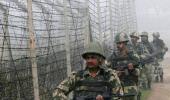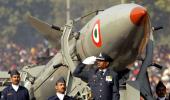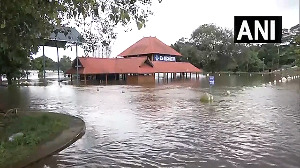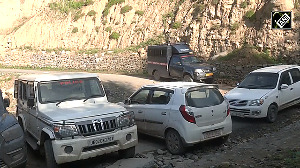India's new high commissioner in Islamabad goes to Pakistan at a time when the country is set to face much internal tumult.
Aditi Phadnis profiles an unusual diplomat.
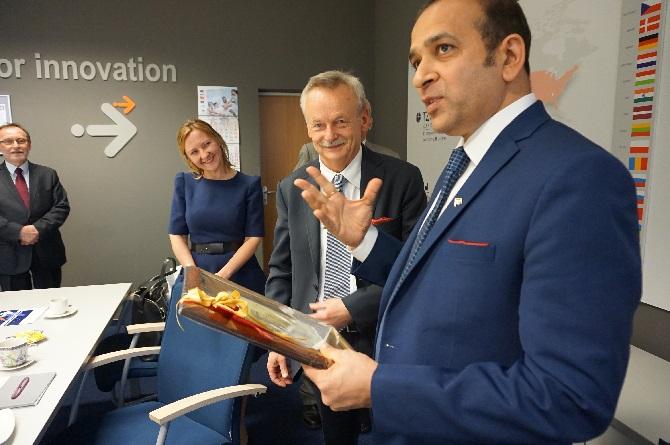
The year was 2001. Atal Bihari Vajpayee and Pervez Musharraf were meeting in Agra over two hot, muggy days in July at a summit that might have changed the world if it had worked. The atmosphere was fraught.
There was an almost complete news blackout and the then spokesperson for the ministry of external affairs, Nirupama Rao, came close to being assaulted by Pakistani journalists for her refusal to brief on what was happening in the Jaypee Palace Hotel where the two leaders were meeting.
But suddenly the two sides were confronted with a problem of plenty: A breakfast meeting with editors where Musharraf tore into India's inflexibility on Kashmir (then information minister Sushma Swaraj had, the previous day, said all issues, including cross-border terrorism, would be discussed, but omitted any mention of Kashmir, something that riled Musharraf no end). Musharraf referred to this frankly at his meeting.
The previous day, Vajpayee and his team thought they had heard a slightly different tone in Musharraf's voice. The two leaders resumed talks on the second day.
Enter Ajay Bisaria, then the private secretary to the PM, with sheets of paper, which he quietly handed over to Vajpayee. This was the transcript of what Musharraf had said to the editors at breakfast a few hours earlier.
PTV had put out the interaction live, and thanks to an agreement between NDTV and PTV, NDTV had access to everything PTV was telecasting.
Vajpayee was the last to know what Musharraf had already told the whole world. Transcript in hand, he confronted Musharraf.
Endorsement of terrorism -- jihadis in Kashmir being equated with the Mukti Bahini in East Pakistan -- was both ahistorical and unacceptable.
If these were Musharraf's views, Vajpayee said, they might as well end the whole show here. But Musharraf was unconcerned.
These are 'my publicly known views', he replied. Jaswant Singh, who was foreign minister, told me many years later: "After the editors' meeting, what followed was a meaningless ritual."
Bisaria was a crucial bystander to the whole episode.
The road Bisaria has taken to Pakistan has been long and chequered. He goes to Islamabad via Warsaw, Poland, where he was India's ambassador.
Poland? Because he is an East Bloc man. His language of specialisation was Russian, he was posted in Moscow between 1988 and 1991 and was witness to the break-up of the USSR, and was also on the East Europe desk at the ministry of external affairs.
Bisaria is a total professional -- and he has a sense of humour. While in Warsaw, the Incredible India tourism campaign featured a picture of a snow-capped mountain range with a foreigner (a Polish woman, maybe?) in a yogasana, as if paying tribute to the mountains.
Bisaria and Amitabh Kant were posing against the poster which had been posted on the Net. The only problem? The mountain was Annapurna and the photograph featured yoga in Kaski, Nepal.
An alert Nepalese tourist posted the picture, to howls in Kathmandu about perpetual Indian effort to colonise its neighbour. Bisaria took no time at all to apologise for an 'honest error'.
When he first came to the PMO, Bisaria was more familiar with the faces of office-bearers of the Communist Party of the Soviet Union than the Bharatiya Janata Party.
He used to keep a list of all important leaders of the BJP with their pictures under the glass top on his desk so that he could identify them correctly.
He and then principal secretary to the PM Brajesh Mishra had a jolly relationship. The PMO used to get a lot of mail and one helpful Indian suggested that India launch a mission to Mars.
Mishra forwarded the letter to Bisaria with the note that this was perhaps a suggestion the ministry of external Aaffairs could consider.
Bisaria goes to Pakistan at a time the country is set to face a lot of internal tumult. Elections are due next year and the fight for the reins of the Pakistan Muslim League (Nawaz) is naked and bitter.
If rumours in Islamabad are true, Shahbaz Sharif could be the next prime minister though he has been disqualified from contesting elections.
Pakistan could be in the same situation India was from 2004 to 2013 -- the constitutionally most powerful person in the country, the prime minister, subject to influence and pressure from other politically more powerful forces.
Bisaria's the man to handle it.
IMAGE: Ajay Bisaria, then India's ambassador to Poland seen in Warsaw, now India's high commissioner to Pakistan. Kind courtesy: https://www.tzmo-global.com

